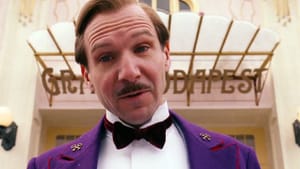Stay in the Loop
BSR publishes on a weekly schedule, with an email newsletter every Wednesday and Thursday morning. There’s no paywall, and subscribing is always free.
The glory that once was (not) Zubrowka
Wes Anderson’s ‘Grand Budapest Hotel’

To urban travelers nowadays, a concierge is the resourceful hotel clerk who finds you a table at a good restaurant or tickets to a hot show. But in Europe’s grand hotels of the 1930s — conceived as oases of extravagant civility in a world of perpetual turmoil — the concierge was central to the luxury hotel experience: a walking embodiment of the good life, capable of catering graciously to his pampered guests’ every conceivable need, including an occasional canoodling.
Amenities like gourmet food and wine, haute couture, artistic pastries, expensive cologne, and recitations of poetry — and the stability they represent — were especially cherished in those shaky middle-European states that were hastily carved out of the Hapsburg Empire at Versailles in 1919.
“There are glimpses of decency in this barbaric slaughterhouse that was once known as humanity,” explains Gustave H., concierge of the Grand Budapest Hotel in the fictional state of Zubrowka, by way of instructing his devoted refugee lobby boy, Zero, in the philosophy of his trade. “And what we aim to provide in our simple, humble, dignified…oh, fuck it.”
That‘s pretty much all you need to know about a papier maché country like Zubrowka, where even a self-assured concierge is never wholly immune to the terrors of capricious fate. Today Gustave may command a formidable enterprise, with armies of jaded aristocrats and obsequious servants at his feet; but tomorrow oafish jackbooted soldiers from a nearby country may be bashing his head against a wall, or a politically connected lawyer may frame him for murder and toss him into prison, there to rub elbows with the dregs of society.
Concierge in prison
In this world dominated by coercion and brute force, Gustave’s survival tools are neither guns nor loving kindness but wit and grandiloquence, not to mention connections to a network of similarly resourceful concierges at similarly grand hotels. The multilayered pastries delivered to Gustave in prison are themselves such stunning works of art that no guard would dare violate them to see if a chisel or knife was concealed inside.
Even in prison Gustave remains true to his profession, and in the process he inadvertently cultivates a loyal cadre of allies among his goonish fellow convicts who help facilitate his escape. “May I offer any of you inmates a plate of mush?” Gustave inquires solicitously as he pushes the breakfast cart along the cell block.
Zweig’s suicide note
Wes Anderson’s marvelously inventive Grand Budapest Hotel is that rare film that can be enjoyed on several levels. It’s simultaneously a parody of and an affectionate paean to 1930s nostalgia. It’s a cartoonish madcap comedy that finds Gustave (Ralph Fiennes) and his devoted Zero (Tony Revolori) leaping from funicular railways and scooting down Olympic ski slopes like the Road Runner, almost always one step ahead of greedy lawyers and homicidal Nazis. It’s also (as Anderson prefers to see it) a tribute to the humanistic vision of the Austrian writer Stefan Zweig, who in his suicide note in 1942 spoke of “my own language having disappeared from me and my spiritual home, Europe, having destroyed itself” and concluded, “I salute all my friends! May it be granted them yet to see the dawn after the long night! I, all too impatient, go on before.”
I, for that matter, saw in this film echoes of the Czech satirist Jaroslav Hašek, whose protagonist in The Good Soldier Schweik foiled his pompous officers by carrying out their every command to its literal extreme. In Gustave’s phone calls to his fellow concierges from a mountaintop pay phone booth I even discerned echoes of The Sting — specifically the sequence in which Paul Newman as Henry Gondorff summons his fraternity of con artists for one last grand swindle.
Ultimately, The Grand Budapest Hotel struck me as a pipe-dream vision — almost a moving oil painting — of a bygone age of interwar faux elegance that was actually a nightmare of drudgery for most everyone who lived through it. Gustave’s world, the aged Zero suggests in the film’s epilogue many years later, “had vanished long before he entered it.”
Perhaps. Yet The Grand Budapest Hotel has arrived at an especially propitious 21st-century moment. In the film, some foreign army or other seems to be forever crossing Zubrowka’s borders and terrorizing the locals. "Plus ça change….,” Gustave yawns. And this month another tin-pot dictator with delusions of grandeur is massing yet another army along the border of yet another shaky middle-European country. Plus ça change, indeed. For people who cherish peace and freedom and democracy, the challenge is: How do we respond to such a threat without provoking Word War III? We could do worse than borrow a page or two from Gustave H.’s playbook.
For another review, by Jake Blumgart, click here.
What, When, Where
The Grand Budapest Hotel. A film written and directed by Wes Anderson. At the Ritz 4, 220 Walnut St., Philadelphia, or Bryn Mawr Film Institute, 824 W. Lancaster Ave., Bryn Mawr, Pa. For Philadelphia area showtimes, click here.
Sign up for our newsletter
All of the week's new articles, all in one place. Sign up for the free weekly BSR newsletters, and don't miss a conversation.

 Dan Rottenberg
Dan Rottenberg